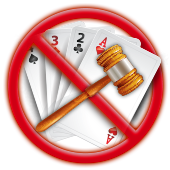How Did UIGEA Come About?

Back in the mid-2000s, online poker in the United States was flourishing. Online qualifiers had made the 2006 World Series of Poker Main Event the largest in history, with 8,773 players taking part. However this all changed with the passage of the Unlawful Internet Gambling Enforcement Act (or UIGEA for short).
UIGEA was tagged on to the 2006 SAFE Port Act - a so-called 'must pass' bill which made it through the United States Congress on the last day before the 2006 midterm elections. Republican Senators Bill Frist and Jon Kyl helped it pass unanimously through the USA Senate, before then-president George W Bush passed it into law on October 13th, 2006.
What was the Effect?
The law prevents financial institutions from processing online gambling transactions (online poker is just one of the gambling activities covered), though it is a common misconception that UIGEA made it illegal for American players to play online poker - players are still within their rights to play online poker on offshore sites that accept USA players.
After UIGEA was passed, a number of the biggest online poker sites around voluntarily withdrew from the America market: many were publicly listed companies, which felt pressured by shareholders to play it safe and steer clear of any potential misinterpretations of the law. This notably shrunk the online poker landscape in the States, but many online poker sites have stayed a part of the market.
Impact on Players

As mentioned, the main issue for American players since the passage of UIGEA has been that there are now fewer sites for them to play on. No American poker player has been prosecuted for playing online poker, and there is still no federal US legislation stopping United States players from making deposits and withdrawals and playing online poker.
However, UIGEA has undoubtedly caused issues for USA players when it comes to deposits and withdrawals. Some banks and credit card providers will not process online gambling transactions out of choice, and American poker players will sometimes need to use other methods such as echeck and prepaid debit cards in order to continue playing. UIGEA has also been blamed for slow withdrawal speeds for online poker players in the States.
Current Legislation
Since UIGEA, a number of American states have passed intrastate legislation to allow American citizens to play online poker from within state boundaries. Those with regulated intrastate online poker are Nevada, Delaware and New Jersey, and a number of American and European companies provide online poker in those particular states.
One benefit of this is a new deposit method for poker players in America, as many can now go to their local bricks and mortar casino and make a deposit in person, with the money then being credited to their online accounts. This makes things simple for American online poker players, and long may it continue.
Expectations for the Future

A number the States of the Union have introduced online poker legislation over the last few years, with varying amounts of progress. These include California and Florida, two of the most populated areas in the United States. There is also hope that those US states already offering online poker will be able to pool their players not only with each other but with other jurisdictions in Europe, leading to huge online poker tournaments similar to the situation before UIGEA was passed.
There is also hope of some form of federal regulation of online poker, and a number of United States politicians, including the likes of Congressmen Joe Barton and John Campbell, have introduced federal bills in recent years. None of these have yet brought about a consensus on online poker, and some vocal opposition still remains, but the fact that there continues to be talk of federal regulation should be seen as a positive.
